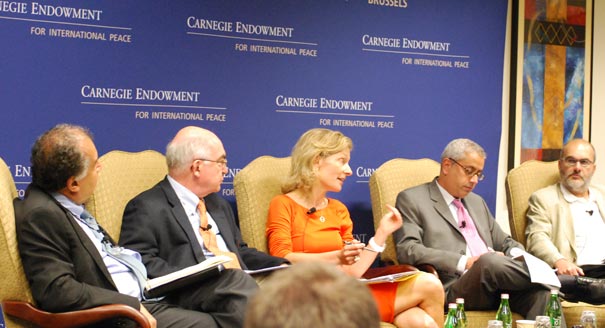Registration
You will receive an email confirming your registration.
IMGXYZ3783IMGZYXSoaring inequality is front and center in the electoral debate. According to data released by economists Piketty and Saez, 93 percent of income gains in 2010 accrued to the top 1 percent of U.S. taxpayers. Real wages and median household incomes have stagnated since the end of the 1990s, while poverty has increased. How does the inequality trend in the United States compare with other countries? What is its economic and political significance? What can U.S. policy learn from others? Brookings’ Kemal Derviş, the International Monetary Fund’s Prakash Loungani, the World Bank’s Branko Milanović, and Carnegie's Uri Dadush addressed these issues. Zanny Minton Beddoes of the Economist moderated.
Inequality Over the Past Decades
- Measuring Inequality: There are many ways to measure income inequality, Derviş explained, but each of the most commonly used indicators demonstrate that income inequality in the United States has increased over the past 25 years.
- Causes: Dadush noted there is a general consensus that skill-biased technological change and financialization have driven increased inequality. Trade patterns, immigration, and money in politics may have also contributed to inequality. Milanović argued that increased inequality in the United States over the past quarter-century seems to depart from the standard Kuznets curve, which posits that income inequality rises during industrialization and then falls as countries transition to a services-based economy. He speculated that the United States could be in the middle of a “second Kuznetsian wave,” challenging the assumption that economies stabilize at a relatively low level of income inequality as they mature.
- An International Perspective: Milanović observed that since the 1970s, the trend of rising inequality has emerged in every region except for Latin America (although Latin America still has the highest level of inequality of any region). He pointed out that it is important to distinguish between what has happened on the national level and what has happened globally. In the United States, inequality increased over the past 25 years, while mean and median incomes stagnated. But globally, income inequality has plateaued, and median and mean incomes actually increased because the poor in populous India and China are climbing up the ladder.
Inequality in a Broader Context
- Is Increased Inequality Bad? Loungani stated there is “good” inequality and “bad” inequality. Some inequality in an economic system is almost certainly desirable because it motivates hard work and performance. But too much inequality can potentially depress economic activity and contribute to social unrest. Derviş argued that there are at least two troubling consequences of increased inequality:
- It has the potential to depress aggregate demand, as income is concentrated among relatively few households.
- It can lead to political capture by the elite.
- The Bigger Picture: Loungani argued that it is important not to lose sight of absolute poverty with a focus on inequality. Even the poor in the United States, he pointed out, are relatively affluent, judging by global standards for wealth. He also noted the need for further research to more firmly establish the negative macroeconomic effects of income inequality.
Remedies
Dadush noted that there are two categories of remedies to increased inequality:
- Improving Productivity: Most countries would undertake steps to improve workforce skills and productivity, even in the absence of increased inequality, simply for their economies to stay competitive. From greater investment in education and health to improving the business climate, these measures would improve market outcomes by preparing workers to compete in a global economy transformed by technology and globalization.
- Redistribution: The second category directly addresses inequality by promoting redistribution of income through, for example, tax policy.
